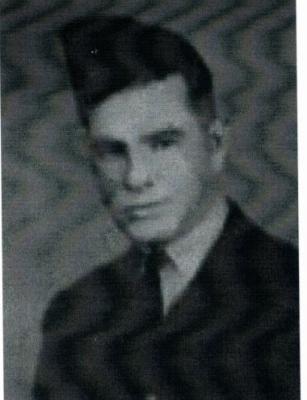By John Telfer
With the advent of Anzac Day 25th April, only a few weeks away, it is time to reflect on local heroes who have made the Supreme Sacrifice in World War 2. One such hero comes to mind and is the subject of this story. At Scots PGC College, Warwick, the Memorial score board is dedicated to Pilot Officer David Lecky Crichton, who is one of the College’s “Magnificent 42” and heroically, made that supreme sacrifice in World War 2.
David was born in Warwick, Queensland, on the 25th September 1912, the second eldest son of William Frederick and Vera Clair Crichton. After completing his primary education at Willowvale State School, where he passed the State Scholarship Exam, David followed his two older brothers John (1921 -1927) and Stewart (1929 – 1930), earlier enrolments at the Scots College. He was very close to Stewart and they were inseparable while at the college. However, David was not deterred by the presence of his two older brothers and set out to establish his own identity in the history of the college.
A very keen and industrious student, David combined his academic and sporting life at Scots with excellent results and gained both his Junior and Senior Certificates in 1928 and 1930, with little effort. He surpassed both his older brothers on the sports field becoming Athletics Champion in 1928 and gained his colours in athletics, cricket and football.
After leaving Scots in 1930, David went to work on the family property at “Maryvale”, Morven, where he worked as a Jackeroo as he loved the land and was quite content to stay and work in a rural area. However, as the dark clouds of war enveloped Australia, David saw it as his duty to enlist in the Royal Australian Air Force. It is interesting to note that David’s service number was only six behind his old Scots master in George Avery, possibly influenced by the news surrounding George Avery’s enlistment promulgated in the “Clansman”, the College old boy’s news- letter.
David enlisted in Brisbane on 23rd May 1940, and was immediately posted to various flying training schools in New South Wales and Queensland before he was posted to Canada under the Empire Air Training Scheme (BEATS). David and his mates sailed to Canada on board the “Aorangi” leaving from Sydney on 30th November 1940 and arrived at Vancouver, Canada, on 23rd December 1940.
In Canada, David excelled in his training and was a very high achiever on all aspects of aircrew training. David achieved Dux of his flying course and made history by being the first Australian winner of the Canadian Airways Trophy, which was presented to him on his graduation parade. On 15th March 1940, the following article appeared in the Edmonton Journal;
“Former Jackeroo on a sheep ranch, Leading Aircraftsman David Lecky
Crichton, was awarded the Canadian Airways Trophy for highest marks
in his class at No 2 Air Observers School. A group of observers graduated
from the school on Friday and presentation of the award was made by Lt.
Colonel Brown, Area Commandant”.
Upon leaving Canada, David sailed to England on the “Andes” arriving at the Firth of Clyde, Scotland on 20th June 1941. From here, it was a train journey to Bournmouth and he arrived at the Royal Air Force Litchfield’s No 101 Squadron. David was now a part of Bomber Command and was to be trained on Wellington bombers. These aircraft were far superior to the squadron’s former Bristol Blenheims, so, David was assigned to a crew that included Pilot Officer Reynolds (Captain/pilot), David as Observer, Sergeant L.A.Nauze (Wireless/air gunner), Sergeant O.W..Barlow (Forward gunner) and Sergeant Myers (Rear gunner).
On the night of 31st of August 1941, under very inclement weather, David and his crew were delayed a take-off, owing to the atrocious weather. However, as the weather cleared, Wellington Z8860 was given the green light to set out to bomb the industrial and railways sections of the German city of Hamburg. For reasons unknown, their aircraft took off from Oakington at 21:12 hours and experienced engine difficulties causing them to crash at Rampton, 7 miles North-West of Cambridge. The forward gunner, Sergeant Barlow was killed on impact and four injured, including David. David never recovered from his injuries and died in hospital on 1st September 1941.
A later Court of Inquiry stated as to the cause of the crash when the Group Commander said:
“I concur in the findings of the court that the take- off of Wellington Z8860
was delayed for some time by showers of rain, and in the past aircraft
have taken off successfully after having their engines running for more
than half an hour”.
On hearing the bad news in Australia, Mr Dunning, Principal of Scots College called a special school assembly to announce to the gathered students, the heroic passing of a much-loved former student of the college. Mr Dunning spoke with a heavy heart when he said:
“He was proud to have known David Crichton. He impressed not
only him, but many others with whom he had spoken. A fine type
of young Australian. An old boy of whom any school would have
been proud”.
Pilot Officer David Lecky Crichton was given a full military funeral with his squadron attending, and now lies buried in the Cambridge City cemetery, England. His grave number is 6523.







